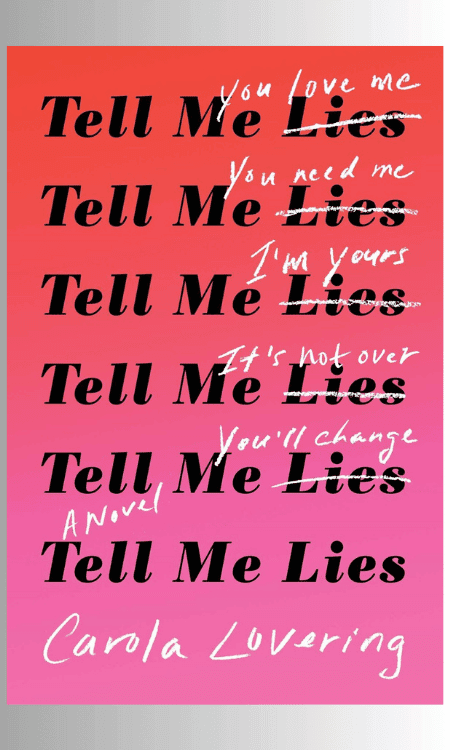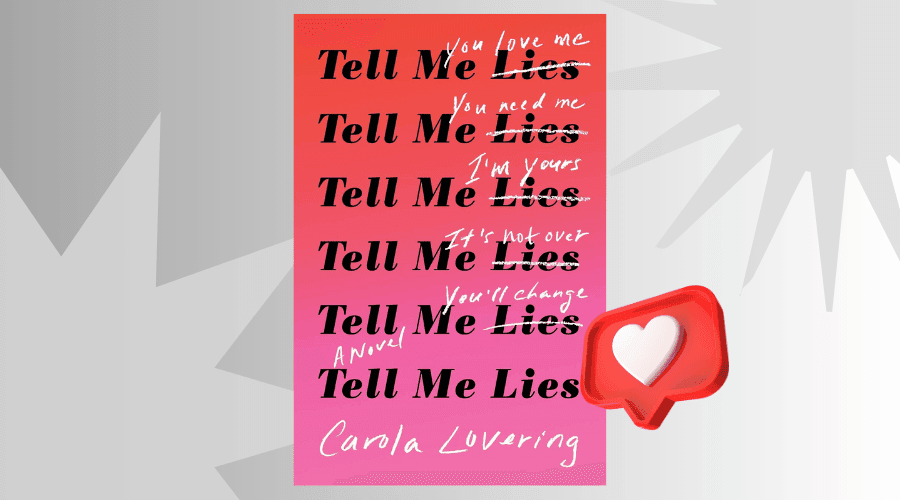Tell Me Lies by Carola Lovering is a captivating story about love, obsession, and toxicity. It follows Lucy Albright, a young woman navigating life after college, and Stephen DeMarco, a charming but manipulative man with secrets. Their relationship becomes an intoxicating whirlwind of passion and heartbreak, exploring the gray areas of love and the lasting impact of toxic connections. Set against the backdrop of college life and young adulthood, it’s a raw, emotional journey about self-discovery and the danger of falling for the wrong person.

| Author | Carola Lovering |
| Publication date | June 12, 2018 |
| Goodreads Rating | 3,47 |
| Page count | 352 pages |
| Topics | Romance, Fiction, Contemporary, Thriller, New Adult, Chick Lit, Adult, College, Mystery Thriller |
Tell Me Lies Book Summary
The story alternates between the perspectives of Lucy Albright and Stephen DeMarco, chronicling their turbulent and addictive relationship over several years.
Lucy, a college freshman from Long Island, moves to Southern California in an effort to distance herself from her painful past and forge a new path. She’s smart, driven, and eager to embrace independence, but her self-esteem is shaky due to unresolved childhood trauma, particularly a betrayal by her mother. When she meets Stephen, an older, confident, and enigmatic student, Lucy is immediately captivated. Stephen seems to be everything she’s looking for: exciting, magnetic, and deeply attentive—when it suits him.
What Lucy doesn’t see at first is Stephen’s darker side. Beneath his charm lies a master manipulator, someone who thrives on control and power over others. Stephen is emotionally unavailable, hiding his insecurities and moral shortcomings behind a mask of confidence. He strings Lucy along, drawing her deeper into a relationship riddled with deceit, gaslighting, and emotional highs and lows. While Lucy becomes increasingly consumed by her obsession with him, Stephen continues to seek validation from others, often at Lucy’s expense.
The novel doesn’t just focus on their relationship but also highlights the impact of their choices on their personal growth—or lack thereof. For Lucy, the relationship becomes a mirror for her own insecurities and unresolved pain. Her journey is as much about navigating her toxic connection with Stephen as it is about learning to understand and prioritize herself. For Stephen, the story offers a glimpse into the mind of someone incapable of true intimacy, revealing how his actions are shaped by his own fears and emotional immaturity.
Set against the vibrant yet tumultuous backdrop of college life and young adulthood, Tell Me Lies explores themes of love, manipulation, obsession, and the red flags we often ignore in the name of passion. It’s a raw and relatable portrayal of how toxic relationships can consume us, the struggle to break free, and the painful but necessary journey toward self-awareness and growth.
In the end, Tell Me Lies is more than just a love story—it’s a cautionary tale about the dangers of losing yourself in someone else and the strength it takes to reclaim your own identity.
Tell Me Lies Ending Explained
The ending of Tell Me Lies by Carola Lovering provides a bittersweet sense of closure and reflection on the toxic relationship between Lucy Albright and Stephen DeMarco.
How does Tell Me Lies book end?
Years after their tumultuous relationship, Lucy has finally started to move forward with her life. She’s living in New York, working a job she enjoys, and is in a healthier mental space. Despite this progress, Lucy is still haunted by her memories of Stephen, particularly the way their relationship shaped her sense of self-worth. The novel culminates with a wedding—Lucy’s college friend—but the event triggers an unexpected encounter with Stephen, who shows up as a guest.
When Lucy sees Stephen again, she’s flooded with a mix of emotions: nostalgia, anger, and a lingering attraction. Stephen, true to form, attempts to charm her and rekindle their connection, seemingly unchanged from the manipulative person he’s always been. However, Lucy realizes how far she’s come. She finally sees Stephen for who he truly is: a deeply flawed, self-serving individual who cannot offer the love or respect she deserves.
Lucy’s Turning Point
The encounter serves as a turning point for Lucy. Instead of falling back into old patterns, she chooses to walk away from Stephen for good. This moment symbolizes her reclaiming her power and breaking free from the toxic hold he had over her for so long. Lucy acknowledges the pain and growth she’s experienced, realizing that while Stephen left a lasting impact on her, she no longer needs his validation to feel whole.
Stephen’s Lack of Growth
On the other hand, Stephen’s behavior in the ending reinforces that he hasn’t changed. He remains stuck in his manipulative tendencies, seeking control and attention rather than true connection. This contrast highlights the personal growth Lucy has achieved compared to Stephen’s stagnation.
The Themes in the Ending
The ending reflects the novel’s core themes: self-discovery, the aftermath of toxic relationships, and the importance of learning to prioritize oneself. Lucy’s decision to walk away signifies not just the end of her relationship with Stephen but also a deeper understanding of her own worth and the boundaries she needs to maintain in future relationships.
Final Takeaway
The ending of Tell Me Lies is both empowering and realistic. It doesn’t offer a neat resolution or romantic reconciliation, but it provides Lucy with the closure and strength to move forward. It leaves readers with a message about the importance of recognizing red flags, valuing self-growth, and letting go of the things—and people—that hold you back.
Tell Me Lies Review
Tell Me Lies by Carola Lovering is an addictive and emotionally raw novel that delves into the complexities of toxic relationships, self-esteem, and the messy journey of young adulthood. The book has earned mixed reviews, but one thing is clear: it resonates deeply with anyone who has ever experienced the push-pull dynamics of an unhealthy love affair.
The Positives
- Relatable Characters: Lucy Albright and Stephen DeMarco are incredibly flawed, and that’s what makes them so compelling. Lucy’s insecurities and emotional struggles feel real and relatable, while Stephen’s manipulative behavior is disturbingly authentic. Their chemistry and dysfunction leap off the page.
- Engaging Narrative Style: The alternating perspectives between Lucy and Stephen give readers an intimate look into both characters’ minds, making it easier to understand their actions—even when you don’t agree with them.
- Raw Emotion: Lovering’s writing captures the highs and lows of infatuation, heartbreak, and self-doubt with brutal honesty. It’s almost uncomfortably familiar for anyone who’s been in a toxic relationship.
- Themes of Growth: Beneath all the toxicity, the novel is ultimately about self-discovery and the difficult, painful process of learning to value yourself.
The Critiques
- Unlikeable Characters: Some readers find Lucy frustratingly naïve and Stephen irredeemable. While this makes the story realistic, it can also make it hard to root for either character at times.
- Pacing Issues: The book occasionally drags, especially in the middle, as Lucy and Stephen’s back-and-forth can feel repetitive.
- Heavy Focus on Toxicity: For readers looking for a love story or redemption arc, Tell Me Lies might feel overwhelming, as it spends most of its time exploring unhealthy dynamics.
Overall Impression
Tell Me Lies is not a light or easy read—it’s messy, emotional, and often frustrating, but that’s exactly what makes it so impactful. It’s a bold and honest portrayal of how people can become entangled in toxic relationships, how manipulation works, and how difficult it can be to let go of someone who feels like an addiction. It’s a cautionary tale that sticks with you long after you’ve finished reading.
If you’re looking for a novel that digs deep into emotional complexity and doesn’t shy away from the darker sides of love, Tell Me Lies is worth picking up. Just be prepared to feel all the feelings—and maybe yell at the characters a bit.
Tell Me Lies: Age Rating
Tell Me Lies is rated 17+ for the book and TV-MA (18+) for the Hulu series due to explicit sexual content, mature themes like manipulation and trauma, strong language, and substance use. Both are best suited for mature audiences.
Is Tell Me Lies Book Spicy?
es, Tell Me Lies by Carola Lovering is definitely spicy! 🌶️ The book features explicit intimate scenes and explores the intense, passionate, and often toxic connection between Lucy and Stephen. The “spice” is not just physical but also emotional, as their relationship is full of manipulation, obsession, and high-stakes drama. If you’re into books with a mix of romance, tension, and darker relationship dynamics, this one brings the heat!
Tell Me Lies Characters
Here’s a rundown of the key characters in Tell Me Lies by Carola Lovering:
- Lucy Albright: The protagonist, a college student with a painful past. Lucy is drawn into a toxic relationship with Stephen, struggling to navigate her feelings of love, obsession, and self-worth.
- Stephen DeMarco: The charming and manipulative love interest. Stephen is emotionally unavailable and thrives on control, using gaslighting and deceit to keep Lucy hooked.
- CJ Albright: Lucy’s father, who she is close to. He represents stability in her life but is also somewhat removed.
- Lucy’s Mother: A source of Lucy’s unresolved trauma, stemming from a betrayal that significantly impacts Lucy’s self-esteem and relationships.
- Pippa: Lucy’s best friend in college. She’s supportive but also has her own flaws and struggles, adding depth to their friendship dynamic.
- Bree: Another close friend of Lucy’s, often offering a more grounded perspective on Lucy’s choices.
- Diana: Stephen’s ex-girlfriend, who serves as a reminder of his manipulative tendencies and complicated romantic history.
These characters form a web of relationships that highlight the complexities of love, friendship, and personal growth. Their interactions drive the novel’s themes of obsession and emotional healing.
Tell Me Lies: Book vs Show
Tell Me Lies was adapted into a Hulu series in 2022, and while it captures the essence of Carola Lovering’s novel, there are several notable differences between the book and the show. Let’s break it down!
Key Similarities
- Core Storyline: Both the book and the show focus on the toxic relationship between Lucy Albright and Stephen DeMarco. The push-and-pull dynamic, manipulation, and emotional highs and lows remain central to the narrative.
- Dual Perspectives: Like the novel, the series explores both Lucy and Stephen’s perspectives, giving viewers insight into their motivations and flaws.
- Themes: The adaptation retains the themes of obsession, manipulation, and the struggles of self-discovery within the context of a toxic romance.
Major Differences
- Timeline:
- The Book: Spans several years, starting in Lucy’s college years and following her into adulthood as she reflects on her relationship with Stephen. The focus shifts between past and present.
- The Show: Primarily focuses on Lucy and Stephen’s college years, narrowing the timeline to emphasize the drama of their budding relationship and group dynamics.
- Supporting Characters:
- The Book: Side characters like Lucy’s friends and Stephen’s other relationships are present but less fleshed out.
- The Show: The supporting cast has expanded storylines. For example, Lucy’s roommates and friends play larger roles, creating a more ensemble feel and adding drama.
- Tone and Pacing:
- The Book: The tone is reflective, often delving into Lucy’s inner thoughts and exploring the long-term emotional scars of the relationship.
- The Show: The tone is more dramatic and heightened, with lots of moments designed for TV impact. Think steamy scenes, heightened conflicts, and a more suspenseful vibe.
- Lucy’s Character:
- The Book: Lucy’s past trauma (especially her complicated relationship with her mother) is a central part of her character development and her attraction to Stephen.
- The Show: While Lucy’s trauma is still present, it’s less emphasized. The show leans more on her college experience and relationships with friends.
- Stephen’s Manipulations:
- The Book: Stephen’s manipulative behavior is more psychological, with gaslighting and emotional games. It’s subtle but devastating.
- The Show: His actions are more overtly dramatic and sometimes exaggerated to drive the plot forward.
- Ending:
- The Book: Offers a sense of closure as Lucy confronts Stephen in adulthood and walks away, symbolizing her personal growth.
- The Show: The first season ends on a cliffhanger, leaving much unresolved and hinting at future seasons.
Which is Better?
It depends on what you’re looking for:
- The Book: If you enjoy reflective, character-driven stories that explore emotional complexity and the long-term effects of toxic relationships, the book is your best bet.
- The Show: If you’re into fast-paced drama, ensemble casts, and steamy, binge-worthy content, the Hulu series delivers the drama in spades.

